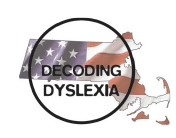|
http://science.house.gov/press-release/smith-dyslexia-we-can-turn-disability-possibility Smith on Dyslexia: We Can Turn Disability into PossibilitySEP 18, 2014
Washington, D.C. - The Committee on Science, Space, and Technology today held a hearing to examine the latest scientific research on dyslexia, the most common reading disability affecting one out of every five people. The hearing reviewed promising future research directions and treatments for people with dyslexia to overcome challenges they face, and explored educational opportunities for students with dyslexia in fields of science, technology, engineering, and mathematics (STEM). Chairman Lamar Smith (R-Texas): “People with dyslexia think in a way that others do not. But typically in our school systems today there is not recognition, early detection, or enough teachers who are trained to spot symptoms of dyslexia early enough to get the students the intervention they need. That is why we have recently seen grass roots groups, like Decoding Dyslexia, form nationwide, and more specialized schools started to fill the gap. Unfortunately, not everyone has access to these types of schools and the learning strategies they instill in their students to help them become successful. For most people, dyslexia is a disability. But if we change the way we approach it, we can turn disability into possibility and give millions of individuals a brighter and more productive future.” Dyslexia is a developmental reading disorder characterized by difficulty with learning to read fluently and with accurate comprehension despite normal or above-average intelligence. The exact causes of dyslexia are not completely understood, but brain imaging studies show differences in the structure and function of the brains of people with dyslexia. Witnesses today provided impassioned testimony about personal experiences with dyslexia and how they have helped others overcome this challenge through innovative and creative problem-solving. While dyslexia is considered a learning disability, many talented people—especially in science, engineering, and the creative arts—have been diagnosed with dyslexia, including Albert Einstein, Thomas Edison, and John Chambers, CEO of Cisco Systems. The National Science Foundation, an agency under the Science Committee’s jurisdiction, funds studies on dyslexia, and particularly, how dyslexic individuals view the universe differently due to visual-spatial skills. The lead astronomer and director of the Hubble Space Telescope Science Institute has dyslexia. The National Institute of Health also studies the neuroscience of dyslexia, as well as funding studies on how dyslexic students can best learn. Witnesses today emphasized that despite common misunderstandings, dyslexia is not due to either a lack of intelligence or desire to learn, and with appropriate teaching methods, people with dyslexia can learn successfully. They also praised progress that has been made in the science behind dyslexia, saying that we don’t have a knowledge gap but gap in action. In other words, our current understanding of dyslexia is not fully utilized in either policy or practice. Over 80 members of Congress have joined the bipartisan Congressional Dyslexia Caucus, co-chaired by Reps. Bill Cassidy and Julia Brownley. The caucus helps educate the public about dyslexia and advocates for policies that support those individuals who have dyslexia. The following witnesses testified today: Panel I: Hon. Bill Cassidy (R-La.), Member, U.S. House of Representatives Hon. Julia Brownley (D-Calif.), Member, U.S. House of Representatives Panel II: Dr. Sally Shaywitz, Director of the Yale Center for Dyslexia and Creativity Ms. Stacy Antie, parent and advocate of a child with dyslexia from Louisiana Key Academy Mr. Max Brooks, author and screenwriter who has dyslexia Dr. Peter Eden, Ph.D., President of Landmark College Dr. Guinevere Eden, Director of the Center for the Study of Learning For more information about today’s hearing, including witness testimony and the archived webcast, visit the Science, Space, and Technology Committee website.
1 Comment
|
Proudly powered by Weebly

 RSS Feed
RSS Feed